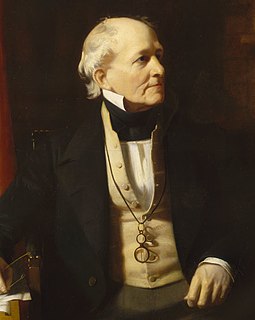See also
- Duke of Beaufort (England), a dukedom in the Peerage of England
- Duke of Beaufort (France), a title in French nobility
Beaufort is the name of a noble family of 14th and 15th-century England, descended from John of Gaunt, 1st Duke of Lancaster. For a list of individual Beauforts, see House of Beaufort.
Beaufort or de Beaufort is also the surname of members of a particular Huguenot family

John Beaufort, 1st Marquess of Somerset and 1st Marquess of Dorset, later only 1st Earl of Somerset, was an English nobleman and politician. He was the first of the four illegitimate children of John of Gaunt (1340-1399) by his mistress Katherine Swynford, whom he later married in 1396. Beaufort's surname probably reflects his birthplace at his father's castle and manor of Beaufort in Champagne, France. The Portcullis heraldic badge of the Beauforts, now the emblem of the House of Commons, is believed to have been based on that of the castle of Beaufort, now demolished.
Beaufort may refer to:

Duke of Somerset, from the county of Somerset, is a title that has been created five times in the peerage of England. It is particularly associated with two families: the Beauforts, who held the title from the creation of 1448, and the Seymours, from the creation of 1547, in whose name the title is still held. The present dukedom is unique, in that the first holder of the title created it for himself in his capacity of Lord Protector of the Kingdom of England, using a power granted in the will of his nephew King Edward VI.

Duke of Beaufort, a title in the Peerage of England, was created by Charles II in 1682 for Henry Somerset, 3rd Marquess of Worcester, a descendant of Charles Somerset, 1st Earl of Worcester, legitimised son of Henry Beaufort, 3rd Duke of Somerset, a Lancastrian leader in the Wars of the Roses. The name Beaufort refers to a castle in Champagne, France. It is the only current dukedom to take its name from a place outside the British Isles.

Hubert is a Germanic masculine given name, from hug "mind" and beraht "bright". It also occurs as a surname.

Sir Francis Beaufort was an Irish hydrographer, rear admiral of the Royal Navy, and creator of the Beaufort cipher and the Beaufort scale.

The Gentleman's Magazine was a monthly magazine founded in London, England, by Edward Cave in January 1731. It ran uninterrupted for almost 200 years, until 1922. It was the first to use the term magazine for a periodical. Samuel Johnson's first regular employment as a writer was with The Gentleman's Magazine.
Beauclerk or Beauclerc is an English surname, from Anglo-Norman meaning "fine scholar". It is also the family name of the Duke of St Albans.
Barnard is a rare Irish surname, and is the Anglicized form of Ó Bearnáin. It is also a more commonly found Norman French form of the French surname Bernard, and was first brought to England and Scotland after the Norman Conquest.The name ultimately derived from the Germanic personal name Bernhard from the element bern "bear" combined with hard "brave, hardy".

Molyneux is a French surname. The surname has been linked primarily to a large French family that settled in Lancashire, United Kingdom from France. By the 14th century the Molyneux family had become so large that it split into three main branches; the Lancashire line, who became the Earls of Sefton, the Nottingham line, and the Calais line, from family still left over in Normandy. There was also a branch of the family who were Irish baronets.
Pullen is an uncommon English surname with a purported Norman origin.

Cavendish-Bentinck is a surname associated with the Dukes of Portland and their descendants. Bentinck family is a Dutch surname brought to England by William Bentinck, an advisor to William III of England. Cavendish was added to the family name by Bentinck's great-grandson the 3rd Duke of Portland, who married in 1766 Lady Dorothy Cavendish, daughter of the 4th Duke of Devonshire. By a family arrangement, she was the heiress to estates which had previously belonged to the defunct Newcastle branch of the Cavendish family, including Welbeck Abbey, which became the principal seat of the Dukes of Portland. Following the death of the 9th Duke in 1990, the family name became extinct.

Henry is a masculine given name derived from Old French Henri / Henry, itself derived from the Old Frankish name Heimeric, from Common Germanic *Haimarīks. In Old High German, the name was conflated with the name Haginrich to form Heinrich.
Lambert is an English and French given name and surname. It is from the Low German form of the anthroponymic name Landberht from the Old High German land "(home) land" and beraht "bright".
Berkeley is a surname. It is also used, uncommonly, as a given name. The name is a habitation name from Berkeley, Gloucestershire, England, itself derived from Old English beorce léah meaning birch lea. People with the name include:
Stafford is an English surname originating from Staffordshire. The Staffords refer to the people of Staffordshire. see also: de Stafford,de Staffort
Conway is a Welsh, Irish & Scottish surname. The name has several origins.
Daniel Augustus Beaufort LL.D., was an Anglican priest and geographer, born in England to French Huguenot parents. He was rector of Navan, County Meath, Ireland, from 1765 to 1818, and a talented amateur architect also remembered for his 1792 map of Ireland.
Penrose is a Cornish-language surname. The surname Penrose is derived from one of the places called Penrose in England and Wales: these are found in ten parishes in Cornwall, several times in Wales and once in Herefordshire.
Arabin is a family name originating in Provence in the south of France, as d'Arabin or D’Arabien.